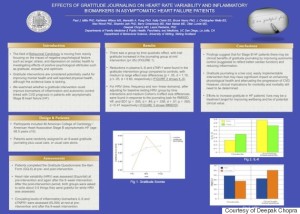By Paul J. Mills, Tiffany Barsotti, Meredith A. Pung, Kathleen L. Wilson, Laura Redwine, and Deepak Chopra
Gratitude, along with love, compassion, empathy, joy, forgiveness, and self-knowledge, is a vital attribute of our wellbeing. While there are many definitions of gratitude, at its foundation, gratitude is a healing, life-affirming, and uplifting human experience that shifts us from focusing on the negative to appreciating what is positive in our lives. Gratitude provides us with a more intimate connection to ourselves and the world around us. In the feeling of gratitude, the spiritual is experienced.
For those who are ill, feelings of gratitude and awe may facilitate perceptions and cognitions that go beyond the focus of their illness, and include positive aspects of one’s personal and interpersonal reality in the face of disease. Such beneficial associations with gratitude have accelerated scientific interest in and research on gratitude and wellbeing. The number of publications on gratitude appearing in the biomedical literature in 5-year increments,since 1960-1965 (http://www.ncbi.nlm.nih.gov/pubmed/) shows almost no publications until 1996-2000 with about 20 studies. That number doubled from 2001-2005. From 2006-2010 publications jumped to 150, and from 2011 to the present over 275 studies on gratitude have been published.

